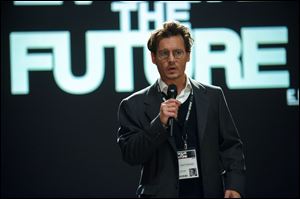
Locked & uploaded: Love, humanity on the line in ‘Transcendence’
4/17/2014
Johnny Depp in a scene from "Transcendence."
There’s a theory among technologists that predicts computers achieving self-awareness and surpassing their human creators.
It’s a moment referred to as “the singularity.”
Dr. Will Caster (Johnny Depp) prefers the term “transcendence.” And with the software technology he’s worked his career developing now at a major breakthrough, humanity is on the verge of reaching this point. Caster considers this to be the next step in human and computer evolution, as man merges with machine. But not everyone is in agreement about this future course.
When challenged by a detractor that he is playing God, Caster flippantly replies, “Yes, but isn’t that what man always does?” Hours later, Caster is shot by a member of a terrorist group bent on protecting humanity from him and AI computers run amok. They’ve obviously seen almost every science-fiction film about technology ever made.
With his body a lost cause, Caster’s loving wife, Evelyn (Rebecca Hall), suggests they can save his mind by uploading her husband’s knowledge, thoughts, and memories into a powerful supercomputer he helped create.
Directed by Wally Pfister. Written by Jack Paglen. A Warner Brothers release, playing at Franklin Park, Fallen Timbers, and Levis Commons. Rated PG-13 for sci-fi action and violence, some bloody images, brief strong language, and sensuality. Running time: 119 minutes.
Critic’s rating: **½
Cast: Johnny Depp, Rebecca Hall, Paul Bettany, Morgan Freeman.
The couple’s science colleague and friend, Max Waters (Paul Bettany), resists her idea, but ultimately agrees to help Evelyn, for the sake of Caster and his own intellectual curiosity. What would a computer with a human mind become?
Transcendence suggests it’s not a good marriage — at least for us non-computers — as Computer Caster turns into a HAL-like OS menace, only with far more power, even using the nano technology that he creates to transform humans into self-healing cyborgs.
This is all part of the master plan, humans fear, that Computer Caster will take control of the world. Morgan Freeman and Cillian Murphy play a scientist and FBI agent who will do anything to stop this from happening.
Wally Pfister, Christopher Nolan’s longtime and brilliant cinematographer, makes his directorial debut in this cautionary sci-fi tale from first-time screenwriter Jack Paglen. But what is an initially imaginative and thought-provoking concept, instead sings the same chorus of super technology as super evil we’ve seen many times before. Pfister could have used some of his former boss’ skill in combining inspired intellectualism and bold ideas with mainstream appeal.
The root of this evil is love: Mankind’s future would not have been placed in jeopardy if Evelyn hadn’t loved Caster so, that she couldn’t bear to let him go. Their love is also the only thing left of Caster’s humanity, which, of course, will be used against him in this high-tech Beauty and the Beast.
Depp doesn’t have much screen time after his character dies, other than appearing in 8-bit form on omnipresent screens in Caster’s high-tech lab and voice work. There’s also no explosive energy or crazed tics to Caster. He’s just a mild-mannered scientist turned quietly though not malevolently evil advanced AI. But because the actor is synonymous with his larger-than-life screen characters (Hunter S. Thompson, Captain Jack Sparrow), to see him in a less eccentric, attention-grabbing role gives the impression that he’s simply going through the motions, though he’s not, even in pixelated form.
Instead, it’s Hall with the heavy lifting, as she must convey and convince us of an enduring relationship, even as it shifts forms.
And while their relationship is believable, it never carries any emotional tragedy. We don’t feel for their predicament and inevitable outcome in the same way we did for Theodore (Joaquin Phoenix) and his OS girlfriend Samantha (Scarlett Johansson) in Her, last year’s story of man falls in love with machine.
And later, as Caster’s power grows and his humanity further diminishes, we fear for her safety more than fret about the loss of her soul mate.
Bettany is the most interesting character in Transcendence, as a scientist conflicted by fear of this technology and his love for his friends. He’s also far more believable in his quest to stop Caster than those he allies with: a terrorist group led by a former student named Bree (Kate Mara). Why does a group so concerned about technology rely on laptops and tablets — especially once Cyber Caster attaches himself to the Internet, giving him the power to be anywhere there’s an online connection?
But the film’s biggest mistake comes in its opening, with Max in the future, introducing us to the story and tipping us off as to how this will all play out, though his narration at the end of the film explains Transcendence’s fascination with water droplets. At least with Pfister at the helm, the water drops — along with the rest of the movie — look good.
Contact Kirk Baird at kbaird@theblade.com or 419-724-6734.